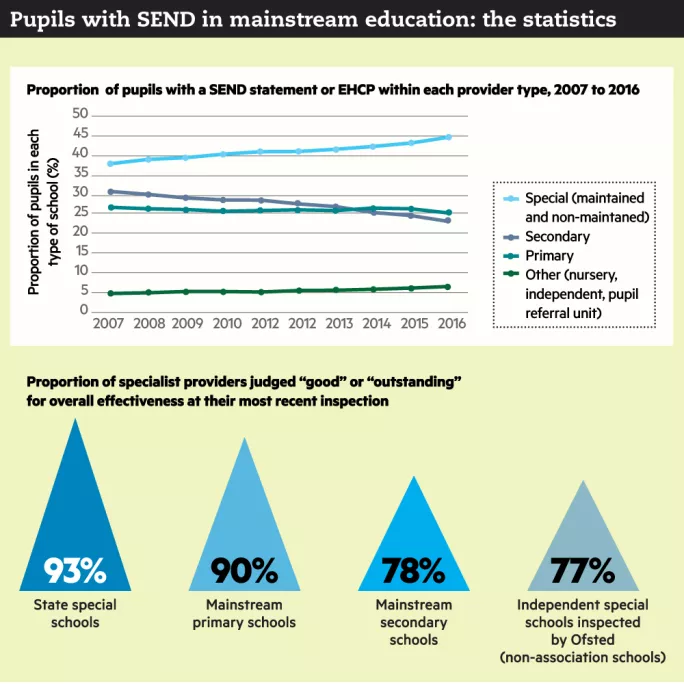Exodus from mainstream marks a wane in inclusion

Parents of children with special educational needs and disabilities (SEND) are increasingly moving their children out of mainstream schools, new analysis released by Ofsted reveals.
The proportion of children with statements of SEND or an education, health and care plan (EHCP) in special schools is at its highest level since 2007, according to figures in the watchdog’s annual report.
The document, published yesterday, also warns that local authorities need to do more to ensure that the progress and safety of pupils with SEND statements or EHCPs is being monitored when they are moved out of maintained schools or their own area.
Ofsted has highlighted government figures showing that 43 per cent of children with EHCPs or statements are now in special schools, up from 36 per cent in 2007.
The proportion of these pupils in mainstream independent schools has also risen from just under 4 per cent in 2009 to over 6 per cent in 2016.
The exodus has been particularly evident in secondary education, the report notes. It says that evidence from Ofsted inspections suggests that the increase in special school placements may relate to parents’ concerns that their child would not get the help they needed in mainstream schools.
“Parents have raised concerns about the ability of mainstream schools to deliver specialist support, such as therapy, which is readily available in special schools,” the report says. “Some parents do not feel that aspirations are high enough or that the curriculum in mainstream schools is broad enough to cater for their child’s current strengths and future needs.
“They also fear that where a local school requires improvement or is inadequate, it may not have the time and resources to prioritise the learning of their child.”
Ofsted inspection data shows that 93 per cent of state special schools are rated as “good” or “outstanding”, compared with 78 per cent of secondary mainstream schools.
Research from the University of Exeter, published in 2014, found that the increasing number of pupils in special schools since 2007 had reversed a 30-year trend of inclusion.
The study found that the proportion of pupils in special schools had fallen from 1.7 per cent in 1982 to 0.75 per cent in 2007, but had risen to 0.8 per cent in 2013.
Professor Brahm Norwich, who carried out the analysis, told TES at the time that he feared that the climate was moving away from inclusion, as schools came under greater pressure to raise standards.
Pupils ‘not unwelcome’
Ofsted states in its report this week that it has found schools are happy to include pupils with SEND.
“There is no evidence from our school or local area inspections that mainstream schools, whether primary or secondary, are not welcoming pupils who have special educational needs and/or disabilities onto their rolls,” it says.
“Children and young people spoken with during school and local area inspections are generally positive about their experiences and the help they receive, whether in mainstream or special schools.”
Earlier this year, the National Children’s Bureau raised concerns that academies were reluctant to take children with SEND unless they had an EHCP in place.
This week’s Ofsted report reveals that some areas have not established systems to check how well all pupils with SEND are doing. Reporting on the first results of a new type of inspection that looks at how effectively education, health and social services work together, the watchdog said there was “careful oversight” of pupils with statements or EHCPs in maintained schools in most areas. But services were “less informed about these pupils’ progress or indeed their safety in independent schools or when they are placed out of the area”.
On provision in mainstream and special schools for SEND pupils, common weaknesses identified by Ofsted include leaders not checking whether support was effective, as well as too little training for staff in how to use specialist resources and assess pupils.
The report adds: “This meant the resources available were not being used effectively and that work was not well matched to pupils’ needs and next steps.”

You need a Tes subscription to read this article
Subscribe now to read this article and get other subscriber-only content:
- Unlimited access to all Tes magazine content
- Exclusive subscriber-only stories
- Award-winning email newsletters
Already a subscriber? Log in
You need a subscription to read this article
Subscribe now to read this article and get other subscriber-only content, including:
- Unlimited access to all Tes magazine content
- Exclusive subscriber-only stories
- Award-winning email newsletters